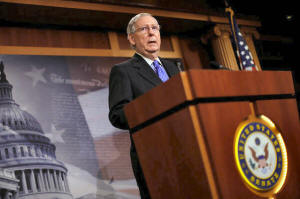|
U.S. lawmakers back Syria strikes, demand
a plan from Trump
 Send a link to a friend
Send a link to a friend
 [April 08, 2017]
By Patricia Zengerle and Amanda Becker [April 08, 2017]
By Patricia Zengerle and Amanda Becker
WASHINGTON (Reuters) - Members of the U.S.
Congress from both parties on Friday backed President Donald Trump's
cruise missile strikes on Syria, but demanded he develop a strategy for
dealing with the broader conflict and consult with Congress on any
further action.
In the biggest foreign policy decision of his presidency, Trump ordered
the firing of cruise missiles at a Syrian air base that U.S. officials
said was the launching point for a deadly chemical weapons attack
against Syrian civilians this week.
"The strike was well planned, well executed. It was certainly more than
a pinprick, and sends a message ... that using chemical weapons again is
not something (Syrian president Bashar al-Assad) can do with impunity,"
Republican Senate Majority Leader Mitch McConnell told a news
conference.
McConnell said Vice President Mike Pence had called him to explain the
rationale for the strikes. It was one of a series of calls by
administration officials to members of Congress beginning shortly before
the strikes and extending until after midnight on Thursday evening.

Senator Bob Corker, chairman of the Senate Foreign Relations Committee,
was called by Attorney General Jeff Sessions, Secretary of State Rex
Tillerson and Trump himself. After seeing the devastation in Syria and
visiting refugee camps, he said he became emotional when he heard the
news.
"When I talked to the president last night, I told him how proud I was
of our country. And him," Corker said.
Democratic Senator Mark Warner, vice chairman of the Senate Intelligence
Committee, said Trump's Director of National Intelligence, Dan Coats,
had called.
"I am hopeful these strikes will convince the Assad regime that such
actions should never be repeated," Warner said in a statement.
'RED LINE'
Partisan debate over how to deal with Syria has been bitter. In 2013,
then-President Barack Obama ran into stiff resistance from many
Republicans, including McConnell, when he proposed military action to
retaliate for a chemical attack that crossed Obama's red line.
Many Democrats, some of whom had paid a political penalty for backing
Republican President George W. Bush's war in Iraq, also opposed
intervention.
Obama's abrupt decision not to fire missiles and instead work with
Russia to remove Assad's chemical weapons infuriated many Republicans
who had backed the Democratic president's proposal.
[to top of second column] |

U.S. Senate Majority Leader Mitch McConnell (R-KY) speaks with the
media at the U.S. Capitol in Washington, U.S., April 7, 2017.
REUTERS/Aaron P. Bernstein

The conflict in Syria has now dragged on for seven years,
devastating the country, destabilizing the region and leaving
millions homeless.
Republican Senator Marco Rubio said he wanted a broader strategy. "I
would love to have one yesterday, or the day before. I'd like to
have one already but I'd rather them design it correctly than not,"
he said, leaving a briefing by General Joseph Dunford, chairman of
the Joint Chiefs of Staff.
Most lawmakers insisted Trump should seek Congress' approval for any
additional military action.
"Congress must live up to its Constitutional responsibility to
debate an Authorization of the Use of Military Force against a
sovereign nation," Democratic Leader Nancy Pelosi wrote in a letter
asking Speaker Paul Ryan to call the House of Representatives back
to Washington to debate a formal authorization to use military
force.
The House is not due to return until late April.
Republican Senator Rand Paul, a member of the foreign relations
committee, called the Syria strikes illegal. Under the U.S.
Constitution, declarations of war require congressional approval.
"We've had no chance to weigh or weigh in on whether we should do it
or not," Paul told reporters.
Democratic Senator Chris Murphy, another committee member, said that
if Congress does not assert itself now, it risked losing its
constitutional right to declare war.
"I think it's devastating to the future role of Congress in foreign
affairs. If we don't authorize this action, I don't see why any
president would ever come to Congress," Murphy said.

(Reporting by David Alexander, Eric Walsh and Warren Strobel;
Editing by Bernadette Baum and James Dalgleish)
[© 2017 Thomson Reuters. All rights
reserved.]
Copyright 2017 Reuters. All rights reserved. This material may not be published,
broadcast, rewritten or redistributed. |